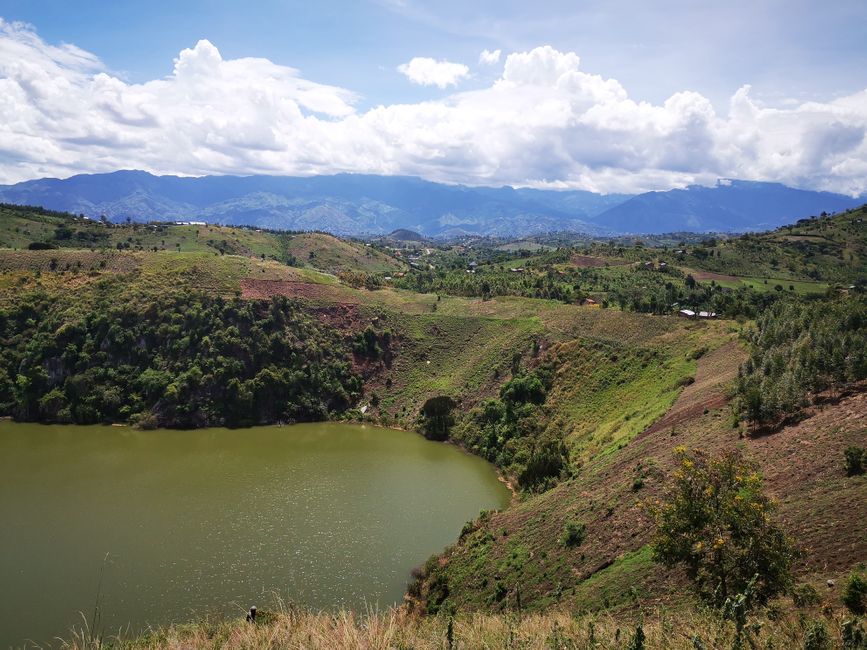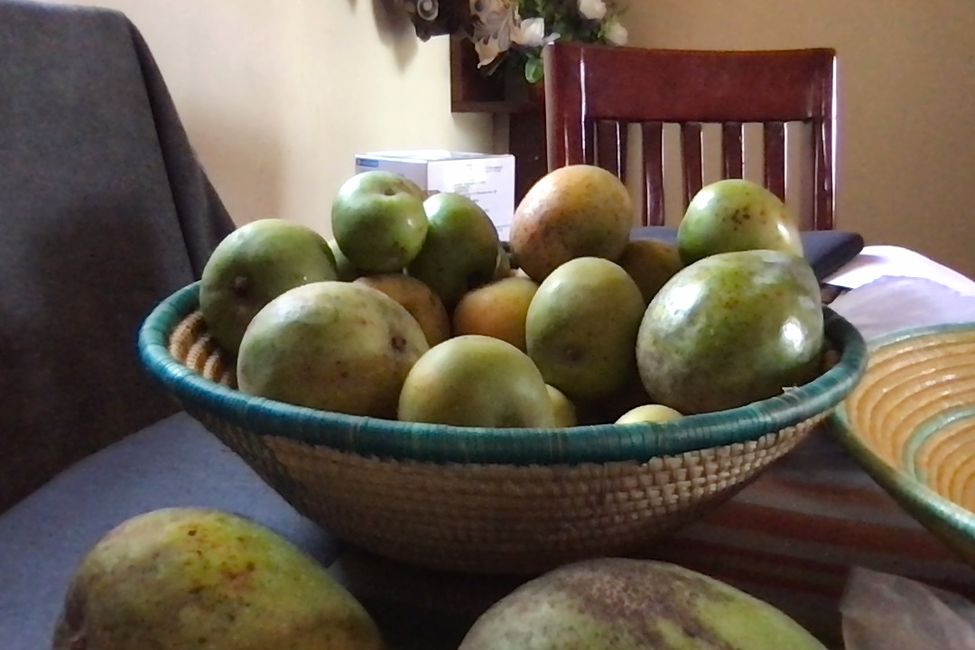Urs
Sehr spannend, danke für die Zeit, die Du in den Blog investierst.
Diese Wochen nützen wohl mehr, als mein Männchen mit der schiefen 5...Day 2
Gipatik: 19.01.2022
Mag-subscribe sa Newsletter
18.01.2022
Last night I wanted to take a shower, or rather a kettle of cold water, but when I turned on the tap, there was a gurgling sound as if the pipes were about to explode. At least I managed to fill half a kettle, but when I stood there wet, soapy on cold tiles, there was no water left. There was no water to be found the next morning either, and the power had gone out during the night. It's fascinating to see how helpless one feels without these two elements, which are secure and omnipresent in Switzerland. In addition, the water is not even drinkable, but when the toilet flush, shower, and dishes all depend on it, you do feel a bit lost. Nevertheless, my feeling this morning cannot be compared to yesterday. Yesterday, I felt lost in everything new, especially because everything is completely different and there is hardly anything familiar to hold on to. Little by little, a feeling of acceptance and letting in emerges, and with that comes a calmness that I haven't felt in a long time. After we put the toast in the toaster at breakfast and wondered why it wasn't getting warm, Regina will pick us up at 10 o'clock to show us the school. We will also occasionally find out which classes and subjects we will be teaching. The journey to the school is long, we drive through rural areas on roads that are more potholes than roads. However, this does not stop Regina from racing past clay huts, cows, and people at an average speed of 60 km/h, slaloming around angrily honking motorcycles. The journey takes 35 minutes, and we expect that if we were to drive ourselves, it would take about 45 minutes. Everywhere, people look incredibly fascinated to see three "Muzungus" driving past, not just one, not two. It is interesting that this word has a double meaning - it means white person, but it can also refer to a local person. If this is the case, it is a compliment for someone who is punctual, smart, ambitious, and honest. Along the way, we see many people making bricks from the sandy, clayey, red soil. The men are covered from head to toe in dirt and scrape the ground into wooden molds from which they then knock out the bricks to fire them in large ovens. Simple houses consist only of a wall of bricks and have corrugated iron roofs or thatched roofs. Houses of a higher class are plastered and often decorated with drawings. We pass through a village where Regina was born. She says that the people of this village were often ridiculed because they are still strongly rooted in old traditions that believe in ghosts and worship a variety of African gods. We also see many churches, mosques, and some dilapidated school buildings. Extreme contrasts arise when you see women with braided baskets on their heads next to new gas stations and signs advertising "German solarpower".
We reach the school, where we are immediately swarmed by a horde of small children who don't want to leave our side. They even want to follow us to the toilet. Well, the word toilet should be seen as a loose definition here, as there are three A5-sized holes in the stone floor that need to be aimed for. The school grounds have a large lawn where the children play soccer. There are two dormitories, one for boys and one for girls. On the wall of the boys' dormitory, there is a fresco of a boy saying, "I always say no to sex." When I ask if this is an acute problem, Regina only replies that "cross-generational copulation" is a common problem here. On the premises, there is a construction site where five new classrooms, a larger office for the school administration, and a storage room are being built. The storage room is intended to store essential goods that parents can provide to the school when they cannot afford the school fees. From here, these goods could be resold if the school does not use them. There are also two other buildings with classrooms, one is an open structure on the sides that is also used for teaching, and a kitchen where food is cooked for the students over a large open fire. We are ushered to a welcome table, where we witness a welcome ceremony. Two students give short speeches, and the principal welcomes us, saying that great things are expected of us. Then the school choir sings for us, followed by apologetic words from the teacher that before COVID, this was the best school choir in Uganda and it is sad what has become of it. Three dances are performed by two different tribes. In total, there are 52 different tribes in Uganda, each with their own traditions and customs. In addition to students and teachers, there are parents and members of the community council in the audience, all dressed up for the occasion. Now everyone wants to hear our voices, and we improvise a short speech, expressing our gratitude and joy for being here. We take photos with all the classes, parents, and dancers, and then it's time for lunch. Generally, every day is the same with slight variations. But today was special because the parents, knowing that we were coming, harvested vegetables from their own gardens to cook for us. The sweet potatoes in particular were incredibly delicious. Unlike the ones we know, they are light in color and have a taste that slightly resembles chestnuts. After this feast, the focus is on determining what we should teach. In the primary school, there are seven classes from Primary 1 to 7. Classes 1 and 2 start at 8:00 and finish at 13:00. Classes 3 to 5 are left on their own until 16:00, and classes 6 and 7 have classes until 17:00. This is from Monday to Saturday. When asked why everyone here has so much school, Regina gives us three reasons. First, parents expect that if they pay money, it should be worth it. Second, they have an extensive curriculum that they must cover because otherwise, the school will get a bad reputation. Even a secondary school that does not start at 5:00 in the morning has no chance of attracting enough students to cover the costs. Third, the children, when they are in school all day, are less likely to get into trouble. Because, as Regina says, if a female student were to get pregnant, then the parents would make a fuss, and that would be troublesome...
Regina said we should choose what and whom we want to teach. Philipp said he would feel comfortable in P1, 2, or 3. P1 could be difficult because of the language, so he will teach mathematics and sciences in P2 and 3. No one really knows what is currently being taught in mathematics. The problem is that the students have not been in school for two years. This means that they are two years older than they should be in their grade, and they have forgotten everything they had learned before. When asked about my favorite subject to teach, I replied that I like English the most. So I will teach English in P4, 5, 6, and 7. Céline will teach math in the same four grades. However, it turns out that the textbooks that are actually needed for preparation have disappeared two years ago with the former headmaster and have never returned. I wonder what has been happening at the school for the past week and a half, but I am slowly learning to accept things as they are. Also, in the past two days, I have waited for someone longer than I have in the past two years. Because Regina can chat! With everyone! What we still don't know is how many lessons the children have in our respective subjects, how long the lessons last, and so on. Tomorrow was supposed to be a day for preparation, but unfortunately, none of us know what we should prepare. The arrival of the promised textbooks is also uncertain.
While we wait for Regina, a little girl of about four years old enters the room. She puts her hand on Philipp's knee and just looks at us for ten minutes. Then she walks away with her brother, who is about six years old and carries their younger sibling on his back. Being six years old and living in a hostel, huge dormitories, never being alone. The whole life here seems to be characterized by not being alone. There is always something happening on the streets. Groups of people talking and laughing. Work is not really done according to fixed times. Maybe a shop is open, maybe not. After visiting the school, we set off for home, or rather we first check on "our" car. A Mitsubishi with a crack across the entire windshield. When the mechanic also says that the shock absorber is no longer working, we start to worry that the windshield will fly off with the third pothole. Regina then says that we can use her car for the time being. Then we go to Kiboga to buy textbooks, beer, and eggs. We get the eggs from a farmer who keeps his chickens in a huge, beautiful house with a tiled roof, while he sleeps in a corrugated iron shack next to it. Then we buy 25 bottles of beer and fresh mangoes before we head to the BSSK. But not before Regina exchanges some words with a few people. It is already 20:00, and we haven't had dinner yet. As we drive onto the secondary school grounds, we are approached by the English and Literature teacher, Liliane, who promises to bring us some coffee. Genuine Uganda coffee from the trees on the school grounds. She comes by and also tells us about the circumcision tradition in her village, where 15-year-olds and above are celebrated during a five-day festival. I also ask her about the literature she teaches. She mentions some Ugandan authors as well as Shakespeare and Sophocles. Generally, literature lessons can be divided into prose, poetry, and theater.
What is noticeable is that people often apologize for what they have or don't have. They are proud of their culture but feel ashamed if something does not meet our standards.
Mag-subscribe sa Newsletter
Tubag (1)

Mga taho sa pagbiyahe Uganda


